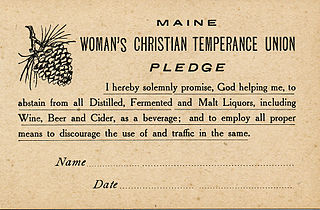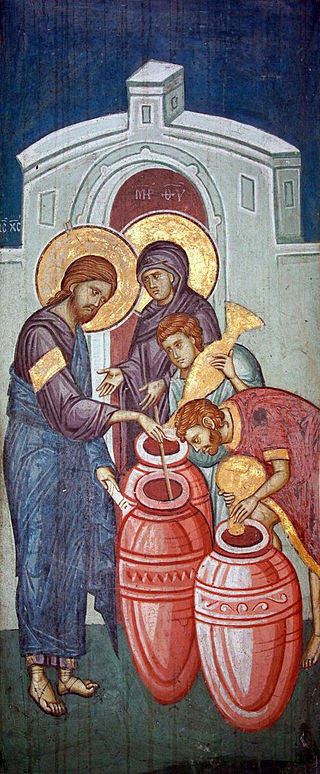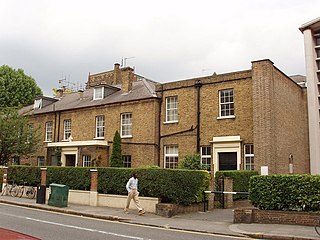
The temperance movement is a social movement promoting temperance or complete abstinence from consumption of alcoholic beverages. Participants in the movement typically criticize alcohol intoxication or promote teetotalism, and its leaders emphasize alcohol's negative effects on people's health, personalities and family lives. Typically the movement promotes alcohol education and it also demands the passage of new laws against the sale of alcohol, either regulations on the availability of alcohol, or the complete prohibition of it.

John Henry Newman was an English theologian, academic, philosopher, historian, writer, and poet, first as an Anglican priest and later as a Catholic priest and cardinal, who was an important and controversial figure in the religious history of England in the 19th century. He was known nationally by the mid-1830s, and was canonised as a saint in the Catholic Church in 2019.

Abstinence pledges are commitments made by people, often though not always teenagers and young adults, to practice abstinence, usually in the case of practicing teetotalism with respect to abstaining from alcohol and other drugs, or chastity, with respect to abstaining from sexual intercourse until marriage; in the case of sexual abstinence, they are sometimes also known as purity pledges or virginity pledges. They are most common in the United States among Catholic and Evangelical Christian denominations, while others are nonsectarian.

Herbert Alfred Henry Joseph Thomas Vaughan was an English prelate of the Catholic Church. He served as Archbishop of Westminster from 1892 until his death in 1903, and was elevated to the cardinalate in 1893. He was the founder in 1866 of St Joseph's Foreign Missionary Society, known best as the Mill Hill Missionaries. He also founded the Catholic Truth Society and St. Bede's College, Manchester. As Archbishop of Westminster, he led the capital campaign and construction of Westminster Cathedral.

The Reichskonkordat is a treaty negotiated between the Vatican and the emergent Nazi Germany. It was signed on 20 July 1933 by Cardinal Secretary of State Eugenio Pacelli, who later became Pope Pius XII, on behalf of Pope Pius XI and Vice Chancellor Franz von Papen on behalf of President Paul von Hindenburg and the German government. It was ratified 10 September 1933 and it has been in force from that date onward. The treaty guarantees the rights of the Catholic Church in Germany. When bishops take office Article 16 states they are required to take an oath of loyalty to the Governor or President of the German Reich established according to the constitution. The treaty also requires all clergy to abstain from working in and for political parties. Nazi breaches of the agreement began almost as soon as it had been signed and intensified afterwards leading to protest from the Church including in the 1937 Mit brennender Sorge encyclical of Pope Pius XI. The Nazis planned to eliminate the Church's influence by restricting its organizations to purely religious activities.

Wilfrid Fox Napier OFM is a South African prelate of the Catholic Church. He served as Archbishop of Durban from 1992 to 2021 and has been a cardinal since 2001. He served as Bishop of Kokstad from 1981 to 1992.
Christian vegetarianism is the practice of keeping to a vegetarian lifestyle for reasons connected to or derived from the Christian faith. The three primary reasons are spiritual, nutritional, and ethical. The ethical reasons may include a concern for God's creation, a concern for animal rights and welfare, or both. Likewise, Christian veganism is not using any animal products for reasons connected to or derived from the Christian faith.

Thomas James Conaty was an American prelate of the Catholic Church. He served as rector of the Catholic University of America (1896-1903) and Bishop of Monterey-Los Angeles (1903-1915).

The Catholic Church historically observes the disciplines of fasting and abstinence at various times each year. For Catholics, fasting is the reduction of one's intake of food, while abstinence refers to refraining from something that is good, and not inherently sinful, such as meat. The Catholic Church teaches that all people are obliged by God to perform some penance for their sins, and that these acts of penance are both personal and corporeal. Bodily fasting is meaningless unless it is joined with a spiritual avoidance of sin. Basil of Caesarea gives the following exhortation regarding fasting:
Let us fast an acceptable and very pleasing fast to the Lord. True fast is the estrangement from evil, temperance of tongue, abstinence from anger, separation from desires, slander, falsehood and perjury. Privation of these is true fasting.

Christian views on alcohol are varied. Throughout the first 1,800 years of Church history, Christians generally consumed alcoholic beverages as a common part of everyday life and used "the fruit of the vine" in their central rite—the Eucharist or Lord's Supper. They held that both the Bible and Christian tradition taught that alcohol is a gift from God that makes life more joyous, but that over-indulgence leading to drunkenness is sinful. However, the alcoholic content of ancient alcoholic beverages was significantly lower than that of modern alcoholic beverages. The low alcoholic content was due to the limitations of fermentation and the nonexistence of distillation methods in the ancient world. Rabbinic teachers wrote acceptance criteria on consumability of ancient alcoholic beverages after significant dilution with water, and prohibited undiluted wine.

The Toledo Area Athletic Conference (TAAC) is a high school athletic conference located in northwest Ohio, with member schools stretched across Lucas, Williams, and Wood counties. It was formed in 1988, and the league sponsors football, cross country, volleyball, golf, basketball, wrestling, baseball, softball, and track & field.

The Catholic Total Abstinence Union of America was a Roman Catholic temperance organization active in the 19th and 20th centuries. The work of Father Mathew in promoting temperance across the U.S. led to the establishment of numerous separate and independent Catholic temperance groups. The Catholic temperance societies of Connecticut created a state union in 1871, from which a national union was formed the following year at a convention in Baltimore, Maryland. 177 such societies from 10 states and the District of Columbia, representing a total of 26,481 members, created the Catholic Total Abstinence Union of America. In total, over 500,000 Roman Catholics made the temperance of the Catholic Total Abstinence Union of America.
William Archer Redmond (1825–1880) sat for Wexford as a member of the Home Rule Party led by Isaac Butt from 1872 to 1880, and was the father of the Irish Parliamentary Party Leader John Redmond.

Lent is the solemn Christian religious observance in the liturgical year commemorating the 40 days Jesus spent fasting in the desert and enduring temptation by Satan, according to the Gospels of Matthew, Mark and Luke, before beginning his public ministry. Lent is usually observed in the Catholic, Lutheran, Moravian, Anglican, United Protestant and Orthodox Christian traditions, among others. Some Anabaptist, Baptist, Methodist, Reformed, and nondenominational Christian churches also observe Lent, although many churches in these traditions do not.

Allen Hall Seminary, often abbreviated to Allen Hall, is the Roman Catholic seminary and theological college of the Province of Westminster at 28 Beaufort Street in Chelsea, London, in the London Borough of Kensington and Chelsea. It is situated on the site of the house that was once occupied by St Thomas More. Though nothing of the house remains, parts of the 16th-century garden wall exist today.

In the United States, the temperance movement, which sought to curb the consumption of alcohol, had a large influence on American politics and American society in the nineteenth and twentieth centuries, culminating in the prohibition of alcohol, through the Eighteenth Amendment to the United States Constitution, from 1920 to 1933. Today, there are organizations that continue to promote the cause of temperance.
The temperance movement in the United Kingdom was a social movement that campaigned against the recreational use and sale of alcohol, and promoted total abstinence (teetotalism). In the 19th century, high levels of alcohol consumption and drunkenness were seen by social reformers as a danger to society's wellbeing, leading to social issues such as poverty, child neglect, immorality and economic decline. Temperance societies began to be formed in the 1830s to campaign against alcohol. Specific groups were created over periods of time dedicated to the different aspects of drinking. For example, in 1847, the Band of Hope was created to persuade children not to start drinking alcohol. Most of these temperance groups were aimed at the working class. Temperance was also supported by some religious groups, particularly the Nonconformist Churches. Although the temperance movement met with local success in parts of Britain, it failed to impose national prohibition, and disappeared as a significant force following the Second World War.

Catholic involvement in the temperance movement has been very strong since at least the nineteenth century, with a number of specifically Catholic societies formed to encourage moderation or total abstinence from alcohol.

The Catholic Total Abstinence Union Fountain (1874–1877) – also known as The Catholic Total Abstinence Centennial Fountain or The Centennial Fountain – is a now-defunct ornamental fountain and drinking fountain located in West Fairmount Park, Philadelphia, Pennsylvania. Created as an attraction for the 1876 Centennial Exposition, it was commissioned by the Catholic Total Abstinence Union of America, a religious organization that advocated for total abstinence from alcohol.

Teetotalism is the practice or promotion of total personal abstinence from the consumption of alcohol, specifically in alcoholic drinks. A person who practices teetotalism is called a teetotaler or teetotaller, or is simply said to be teetotal. Globally, almost half of adults do not drink alcohol. A number of temperance organisations have been founded in order to promote teetotalism and provide spaces for non-drinkers to socialise.















